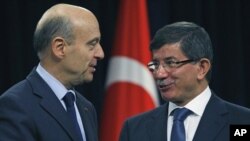Despite strained diplomacy between France and Turkey, the two nations have found mostly common ground in supporting Syrian opposition.
A French objection to Ankara's bid to join the European Union has severely strained ties between the powers, which have been exacerbated by recent policy differences over Libya.
After meeting with his Turkish counterpart Ahmet Davutoglu in Ankara on Friday, French Foreign Minister Alain Juppe said both countries agree Syrian President Bashar al Assad's government crackdown is unsustainable and that the time has come for France and Turkey to align Syrian policies.
Juppe said Paris is preparing to submit a resolution to the United Nations Security Council that would condemn Syria and possibly pave the way for increased sanctions. He also said France opposes unilateral intervention in Syria and that any such decision would have to be made by the United Nations.
On Thursday in Istanbul, head of Syria's exiled Muslim Brotherhood called on Turkey to intervene militarily. Both Juppe and Davutoglu said they will oppose such a move unless agreed upon by the U.N.
Davutoglu said Turkey will do everything to stop the bloodshed from the government backlash in Syria, starting first with added sanctions. He said it was premature to discuss military intervention.
Coordinating divergent groups
France and Turkey have provided havens for some key Syrian opposition figures.
Suat Kiniklioglu, former chair of the Turkish parliamentary committee on foreign affairs and member of the ruling Justice and Development Party (AKP), says France and Turkey can play key roles in helping Syria's divergent opposition groups solidify.
"The catchword right now is the maturing of the Syrian political opposition," said Kiniklioglu, who emphasized AKP's encouragement of only peaceful resistance. "Obviously [the French] have contacts. We do as well. If these can be brought together to help them mature, to help them organize better, and to get unified around a leadership, that would obviously be very helpful for potential changes that are likely to happen in Syria."
But France and Turkey differ on what to do about the Free Syrian Army, a militia made up mostly of defectors from Syrian security forces. The group has claimed responsibility for a number of attacks in Syria this week and, according to some reports, receives tacit support from Turkish forces, including the harboring of a top Syrian military defector.
Juppe stressed the need for the Syrian opposition to remain peaceful, warning of the dangers of civil war.
Soli Ozel, an international relations expert at Istanbul's Kadir Has University, says Ankara is taking a political risk by aligning with the Free Syrian Army.
"I find it a very risky position to take, to host the so-called commander of the Syria Free Army here on Turkish soil," said Ozel. "But I understand he is being kept under a very tight leash. Will that change in the future? I don't know. I hope it doesn't because that puts Turkey in really hot water. Do you really want to be hosting an army that is fighting your neighbor?"
For now, France and Turkey are agreeing to move toward sanctions before Syria heads toward what many fear is a path to civil war.
Turkey, France Find Common Ground on Syria
- By Dorian Jones




